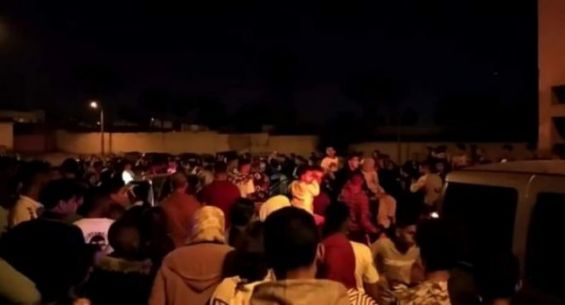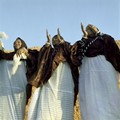In Morocco, the number of daily coronavirus infections has been on the rise. The high numbers of confirmed cases come as Moroccans celebrated last week Eid al-Adha and some of its local festivities that do not go hand in hand with the preventive measures set up to avoid the spread of the virus.
In Inzeggane, an annual festival that follows Eid al-Adha was cancelled by the NGO that organizes it due to the health crisis. However, the decision did not prevent young people from gathering on Saturday evening to celebrate the «Boujloud» festival, without wearing face masks and without respecting social distancing measures.
The same thing happened last week, when several Moroccans decided to hit the road and travel ahead of Eid al-Adha despite the travel ban to and from eight cities imposed by the authorities. As a result, many travelers found themselves stranded for hours in jammed roads and highways while others suffered from life-threatening and deadly accidents.
Several factors can be behind this «devil may care» attitude adopted by several Moroccans amid the current epidemiological situation in the country. «We have the impression that there has been some confusion at the governmental level», acknowledges Chakib Guessous, a sociologist and anthropologist.
He recalls that «announcing the extension of the lockdown by the head of government, followed by a statement, the next day, of the Ministry of Finance authorizing companies to resume their activities» as well as «the recent travel ban» were confusing measures.
A political speech full of contradictions
To Guessous, «there has been contradictory speeches» and Moroccans «have prepared themselves to travel, before they were prevented from it at the last minute». This ban «was not followed by a control on the ground, as some people said on social media».
«Today, the government's word is not sufficiently clear and understandable to citizens. We can't tell people to stay home tonight and go to work the next day».
For the sociologist, «the day the authorities eased the lockdown, people understood that everything was back to normal». «Social distancing, like hand-washing, is difficult to monitor, unlike wearing masks, but the State had to be uncompromising on this last element, because by letting it happen, people think that the risk has decreased», he added.
Psychosociologist Mohssine Benzakour also recognizes that there are «several factors that contribute to this phenomenon, especially the fact of no longer believing in government decisions after the fatal error of closing 8 cities on the eve of Eid».
«In Morocco, there is what is official, like the decision of the NGO to cancel the festival in Agadir, but there is also the unofficial, like those who find pleasure in disguising themselves amid this celebration», he said.
«Moroccans are starting to doubt the government's decisions. At the start of the lockdown, Morocco was being held a role model by many countries, while today, we are seeing figures which are becoming staggering and which are scary. At some point, we doubt the government's decision, consider it to be one error among others and therefore take risks».
This is why «in the eve of Eid, people raced against time to travel and not submit to the decisions of the State», he added.
Long lockdown and «restrictive» customs and practices
This decline of the government's popularity, which is reflected in particular through memes, caricatures and jokes on social media, must also be taken within its context.
Indeed, it happened especially after a long lockdown that lasted several months, which heavily affected several Moroccan families. «We are facing an exceptional disease and the confinement has been global. People have been cut off from their habits and deprived of their social relations», recalls sociologist Chakib Guessous.
Thus, after «courageous, important and exemplary decisions that people respected», not abiding by the rules became widespread since the second month of lockdown, he added, explaining that «these Moroccans had their reasons for leaving», especially financial ones, since «State aid was important but not sufficient».
«For once they could find each other, they let themselves go. This is also what happened in Europe for the Fête de la musique. At some point, we need to have fun and open up», he stressed.
But it is not only this fatigue that we should blame. «There are also habits and customs which exert a social constraint within Moroccan society», recalls, for his part, Moroccan researcher and sociologist Zakaria Akdid. «These habits and customs are reconfirmed and repeated».
«Since the start of confinement, Moroccans have remained attached to certain practices despite the health crisis. For example, for the Taraweeh prayers, some people used to gather on roofs to pray».
For the researcher, «these habits and customs have a meaning for Moroccans and we cannot, at any given moment, come and simply forbid them».




 chargement...
chargement...












